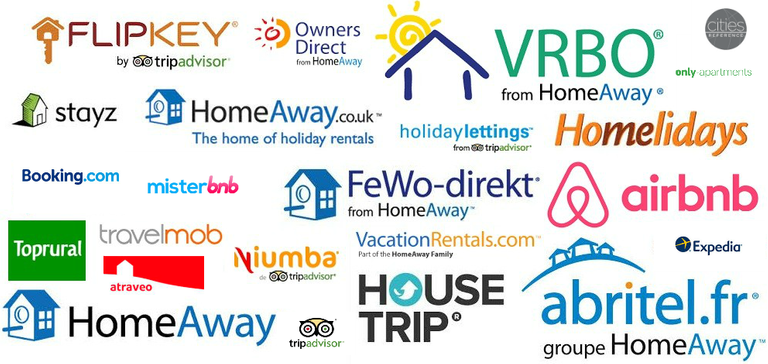
Ten years ago, the vacation rental industry was forever changed by a small, obscure startup out of Silicon Valley called Airbnb, ushering in the rise of sharing economies which are estimated to grow from $14B in 2014 to $335B by 2025. Since then, numerous related industries have been shaken up. The entire space has quickly evolved, creating entire ecosystems built on the backs of the industry’s new and innovative platforms.

For a sharing economy that is often referred to as peer-to-peer, there are a lot of middlemen involved in vacation rentals, many of which base their entire business on taking a percentage of each transaction.
The blockchain has often been cited as one of the best ways to cut out middlemen. Here are some ways each of these players may be impacted in the future.
Vacation Rental Middlemen
Portals
Transaction fees: 5–20% for guests, 3–5% for hosts
The vacation rental space has many, many players, all involved in varying ways. As far as marketplaces, sometimes also referred to as OTAs (online travel agents) or portals, the clear #1 and #2 are Airbnb and Booking.com.
After this duopoly, the landscape of portals becomes much more long tail, peppered with various niche solutions like Misterb&b, which focuses on home sharing for the gay community, that are trying to gain ground in what has been looking more and more like a winner-take-all market.
Portals represent the biggest and most powerful middlemen amongst a sea of little fish trying to get their piece. At Origin, we’re working hard to disrupt these middlemen in some way, if not by replacing them entirely, by at least leveling the playing field and keeping them honest with their growing transaction fees.
Our smart contracts allow hosts and guests to transact directly with one another without needing to rely on intermediaries like Airbnb to provide things like identity, reputation, dispute resolution and escrow.
Thanks to upcoming decentralized home sharing networks like Trips, an Origin marketplace partner, communities from around the world are becoming more educated on how blockchain will allow hosts to keep more of the money they make and guests to spend less on accommodations.
Property Managers
Transaction fee: 20–40% (includes portal transaction fees)
For hosts that do not want to deal with the headaches associated with managing their vacation rentals, property managers are willing to take over the process from start to finish…for a hefty fee.
Property managers have come to rely on major portals like Airbnb and Booking.com to keep their properties booked, but they are also on the constant lookout for opportunities to operate effectively without them. Many, in fact, are building out portals within their own websites that they send guests to in order to avoid portal transaction fees.
Origin will soon be releasing a marketplace creator that will allow anyone to quickly build a branded and customized marketplace, something that property managers might consider using in lieu of websites that require their own development efforts. As more and more software is built to abstract away interacting directly with the blockchain and allow everyday non-technical users to leverage it, power could shift away from major portals in the space and both guests and hosts will see their leverage increase within the ecosystem.
Channel Managers
Fees vary wildly (both transaction and subscription) and lacks transparency
When property managers are managing so many properties that a simple listing update becomes a monumental task, they turn to channel managers. Channel managers allow property managers to view, edit and manage their home sharing listings across numerous portals.
As long as there is an easy way to keep listing data in-sync between all portals, there is little downside for a channel manager adding a new upstart blockchain-based portal like LockTrip. As bookings increase and the property owners see they are being charged fewer fees or being rewarded with tokens, they will begin to favor blockchain-powered portals over today’s centralized counterparts.
By tapping into this decentralized inventory, which has transaction fees that are much lower or in some cases zero, channel managers can increase their margins, put more money in their customers’ pockets, or some combination of both.
Middlemen Consolidation
While many have touted that “cutting out the middlemen” is an inevitability due to the rise of the blockchain, another (perhaps more likely) possibility is that we will see a consolidation of middlemen. As technology improves and allows parties to trustlessly transact with each other, middlemen will be forced to add value in different ways as transaction fees race to the bottom.
In the context of vacation rentals, hosts and guests will be the ultimate winners of lowering transaction fees. Many of today’s challenges, however, including much-needed UX improvements, have made consumer adoption an uphill battle, so business adoption from today’s middlemen like property managers and channel managers may provide the primary push of blockchain-powered home sharing inventory to users rather than guests and hosts using decentralized platforms directly.
While it is still unclear which middlemen will innovate and which will fade away, companies banking on the long-term success of high transaction fees will eventually be pushed aside by those with new business models that better align incentives across network participants. Today’s blockchain-powered marketplaces are still in the experimental phase but will likely push their way into the broader market through one of the many intermediaries that already have a strong foothold somewhere in the middle of these so-called “peer-to-peer” transactions.